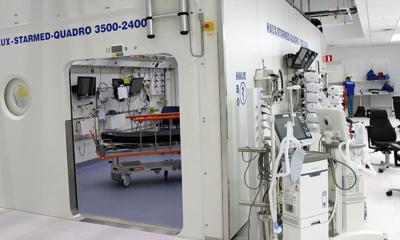News • Genome editing system
CRISPR-based treatment destroys cancer cells
Researchers at Tel Aviv University (TAU) have demonstrated that the CRISPR/Cas9 system is very effective in treating metastatic cancers, a significant step on the way to finding a cure for cancer.

The researchers developed a novel lipid nanoparticle-based delivery system that specifically targets cancer cells and destroys them by genetic manipulation. The system, called CRISPR-LNPs, carries a genetic messenger (messenger RNA), which encodes for the CRISPR enzyme Cas9 that acts as molecular scissors that cut the cells’ DNA.
The results of the groundbreaking study, which was funded by ICRF (Israel Cancer Research Fund), were published in Science Advances. “This is the first study in the world to prove that the CRISPR genome editing system can be used to treat cancer effectively in a living animal,” said Prof. Dan Peer, VP for R&D and Head of the Laboratory of Precision Nanomedicine at the Shmunis School of Biomedicine and Cancer Research at TAU. “It must be emphasized that this is not chemotherapy. There are no side effects, and a cancer cell treated in this way will never become active again. The molecular scissors of Cas9 cut the cancer cell’s DNA, thereby neutralizing it and permanently preventing replication.”
To examine the feasibility of using the technology to treat cancer, Prof. Peer and his team chose two of the deadliest cancers: glioblastoma and metastatic ovarian cancer. Glioblastoma is the most aggressive type of brain cancer, with a life expectancy of 15 months after diagnosis and a five-year survival rate of only 3%. The researchers demonstrated that a single treatment with CRISPR-LNPs doubled the average life expectancy of mice with glioblastoma tumors, improving their overall survival rate by about 30%. Ovarian cancer is a major cause of death among women and the most lethal cancer of the female reproductive system. Most patients are diagnosed at an advanced stage of the disease when metastases have already spread throughout the body. Despite progress in recent years, only a third of the patients survive this disease. Treatment with CRISPR-LNPs in a metastatic ovarian cancer mice model increased their overall survival rate by 80%.
“The CRISPR genome editing technology, capable of identifying and altering any genetic segment, has revolutionized our ability to disrupt, repair or even replace genes in a personalized manner,” said Prof. Peer. “Despite its extensive use in research, clinical implementation is still in its infancy because an effective delivery system is needed to safely and accurately deliver the CRISPR to its target cells. The delivery system we developed targets the DNA responsible for the cancer cells’ survival. This is an innovative treatment for aggressive cancers that have no effective treatments today.”
Recommended article

News • For the development of CRISPR/Cas9
Nobel Prize in Chemistry goes to Emmanuelle Charpentier and Jennifer A. Doudna
The Royal Swedish Academy of Sciences has decided to award the Nobel Prize in Chemistry 2020 to Emmanuelle Charpentier from the Max Planck Unit for the Science of Pathogens, Berlin, Germany, and Jennifer A. Doudna from the University of California, Berkeley, USA, “for the development of a method for genome editing”, more commonly known as the 'gene scissors' CRISPR/Cas9.
The researchers note that by demonstrating its potential in treating two aggressive cancers, the technology opens numerous new possibilities for treating other types of cancer as well as rare genetic diseases and chronic viral diseases such as AIDS.
“We now intend to go on to experiments with blood cancers that are very interesting genetically, as well as genetic diseases such as Duchenne muscular dystrophy,” says Prof. Peer. “It will probably take some time before the new treatment can be used in humans, but we are optimistic. The whole scene of molecular drugs that utilize messenger RNA (genetic messengers) is thriving – in fact, most COVID-19 vaccines currently under development are based on this principle. When we first spoke of treatments with mRNA twelve years ago, people thought it was science fiction. I believe that in the near future, we will see many personalized treatments based on genetic messengers – for both cancer and genetic diseases. Through Ramot, the Technology Transfer Company of TAU, we are already negotiating with international corporations and foundations, aiming to bring the benefits of genetic editing to human patients.”
Source: American Friends of Tel Aviv University
20.11.2020











